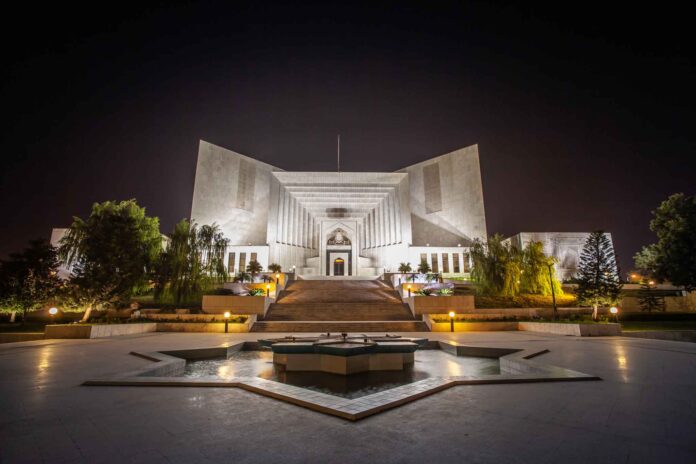ISLAMABAD, Pakistan: As expected, the judiciary in Pakistan is now divided and exposed for its historic convenience to certain groups, elites, and individuals. As expected, the parliament first in its history took a stiff position against the Chief Justice and judges the multi-party government of PDM calls “hand-picked”.
Parliamentarians understand that this will be the last battle of the parliamentary system in Pakistan if parliamentarians are defeated this time. Bar and Bench are divided over a law the Parliament passed to rephrase powers of taking suo motu by the Chief Justice of the Supreme Court of Pakistan while the CJ whose power will be shared with the three-membered committee has killed the bill before it could become an Act of Parliament.
The Supreme Court of Pakistan has a long history of infighting with parliamentarians and several decisions of the Supreme Court including the death sentence of former prime minister Zulfiqar Ali Bhutto in 1979 and sending two prime ministers to home are prime cases of this long history.
The sitting government of PDM claims that the judiciary is supporting former prime minister Imran Khan in every case and the sitting Chief Justice has a vendetta against PDM leadership. Whosoever is saying whatsoever is a debatable and long discussion but the bill “the Supreme Court (Practice and Procedure) Bill, 2023 does not clamp the powers of the Supreme Court or the Chief Justice rather it includes two more judges in the committee that would be authorized to use suo motu power.
The Bill proposes that every cause, appeal, or matter before the Supreme Court shall be heard and disposed of by a bench constituted by a Committee comprising the Chief Justice of Pakistan and two senior judges in order of seniority. It further states any matter invoking the exercise of original jurisdiction under clause (3) of Article 184 of the Constitution shall be first placed before the committee for examination and if the committee is of the view that a question of public importance with reference to enforcement of any of the fundamental rights is involved then it shall constitute a bench comprising not less than three judges of the apex court, which may also include the members of the committee for adjudication of the matter. The Bill recommends that an appeal shall lie within 30 days from the final order of a bench of the Supreme Court, which exercised jurisdiction to the larger bench of the apex court and such appeal shall for hearing be fixed within a period not exceeding fourteen days. Furthermore, it grants a party the right to appoint counsel of its choice for filing a review application. An application pleading urgency or seeking interim relief filed in a cause, appeal, or matter shall be fixed for hearing within 14 days from the date of its filing.
Politicians, media, law practitioners, and even judges of the Supreme Court and members of Bar Councils are raising a series of questions and allegations over the judiciary that includes:
- The judiciary is taking over the State’s functioning to favor one political party.
- Current law by Parliament is an attempt to reduce the misuse of power by any individual.
- Parliament is not asking to take any powers away from the judiciary, rather it is only saying that instead of one person deciding critical matters, it should be combined wisdom. So, where is any attempt to interfere in judicial powers as claimed by CJ?
- Do we want to continue giving unlimited and unchecked powers to our judges?
- Who has failed to give access to justice to our 220 million people despite 75 years of independence?
- Who takes an average of more than 20 years to decide a case and still has no regrets?
- Who have accumulated hundreds of thousands of pending cases in the judicial system and have no concern to give timely justice which is their primary job?
- Who has failed to develop any effective system to decide business and economic cases – a significant contributor to our economic collapse today?
- Who is failing to improve the court infrastructure and systems and is still using the infrastructure and systems mostly left by colonial masters 75 years ago?
- Who commits the highest level of conflict of interest by refusing to be accountable to anyone except their own selves which is no accountability?
- Who has consistently proven to decide cases based on the sides which suited them in the last 75 years?
- Who has failed to ensure rule of law due to their changing interpretations of the law?
- Do we want to continue giving them these unlimited and unchecked powers so they continue to make our 220 million people and the entire nation suffer?
These questions look pertinent because this is the moment in Pakistan’s history where parliamentarians can change things for the better by reducing the powers of individuals and giving them the combined wisdom of a few. And if parliamentarians do not make the right decision today and continue giving any institution unlimited powers, then parliament will continue to suffer as a nation
In February 2023, Supreme Court released data on the pendency of cases in the Supreme Court and said that a total of 24,303 cases were decided during the period from 2nd Feb 2022 to 25th Feb 2023 against the total institution of 22,018 new cases during the said period. The pendency/backlog of cases in the Supreme Court of Pakistan has thereby been reduced by 2,285 cases from 54,735 to 52,450. The number of cases decided in the annual period ending February 2023 is the highest since 2018 when the total disposal was 16,961 cases.
Meanwhile, a newspaper report published by Daily Dawn on July 13, 2022, indicated that the superior and lower judiciaries have a backlog of 2.144 million cases as 4.102m cases were decided and 4.06m new cases were filed during 2021.
The report further indicates that the Supreme Court, Federal Shariat Court, and five high courts of the country disposed of 229,822 cases and 241,250 new cases were instituted during last year and pending cases stood at 389,549 before the superior courts on Dec 31 while the same tally was 378,216 on Jan 1, 2021.
The report added that 1,783,826 cases were pending trial at the start of last year before the district judiciary of the country and it adjudicated 3,872,686 cases and 3,822,881 fresh cases were filed during last year and total pendency stood at 1,754,947 before lower judiciary on Dec 31.
While referring to the sources the report said that according to the statistics gathered by the Law and Justice Commission of Pakistan, at the start of 2021, 46,695 cases were pending before the Supreme Court and at the end of the year, they stood at 51,766 as 12,838 cases were decided while 18,075 new cases filed at the apex court last year.
An academic paper published in the Journal of Law & Social Studies (JLSS) (Volume 3, Issue 2, pp 124-132) titled “Justice Delayed or Denied: The Myth of Justice in Pakistan” authored by Dr. Muhammad Bilal who has done his Ph.D. degree in Law from the United Kingdom believes that:
“Justice in Pakistan has become a myth and an unachievable tool. In Pakistan, only the concept of delayed justice exists as the delayed justice which actually is a denied justice. There are several reasons for delayed justice including complex procedures, old and ineffective laws, the attitude of judges and lawyers, and the backlog of pending cases in the superior as well as lower judiciary of Pakistan. According to the research of “F.S.Khan,” Pakistani courts require the continuous visits of the suit’s parties, and normally for the decision of any conflict a defendant makes 72 visits to the courts, and a decision of case costs nearly 0.2 to 0.3 million upon such party. Continuous visits to courts not only cause a financial crisis but can also have a psychological impact on the suit’s parties.
Judges are the backbone of the judiciary and in Pakistan, they have no professional attitude. Judges perform their function only for salary but not for justice (Sherwani, 2006). Due to such behavior, the backlog of pending cases is increasing day by day and denying justice. A report “Study of the informal justice system in Pakistan” estimated that Pakistani courts need “15 years” to try the backlog of pending cases and there will be a condition that in those “15 years” no new case should be instituted in the courts. Normally Pakistani courts take “25 years” to decide a case and “5 years” more to execute the decree (Khan, 2004). Due to such behavior of courts, the cases are accruing day by day. In January 2021 the numbers of pending cases were “2162042” (Statement of cases Pending, January 2021). But according to “Consolidate statement of pending cases, pendency, institution and disposal of cases during the period August 2021” the Pakistani Judiciary has a backlog of “2,177,527” cases in August So from January to August 15485 cases added to the stock of pending cases. The cases are accumulating day by day consequently, delaying and denying justice”.
One can find several such reports about justice and denial of justice in Pakistan however, such reports have failed to send a message to the judiciary that it must fix its issues instead of trespassing into the work of others. Unfortunately, the Constitution of Pakistan provides exceptional power to the judiciary, and criticizing the judiciary is unlawful according to the Constitution 1973 that is the reason that debating the rule of the judiciary is discouraged in Pakistan, resulting in almost no accountability to the judiciary.






